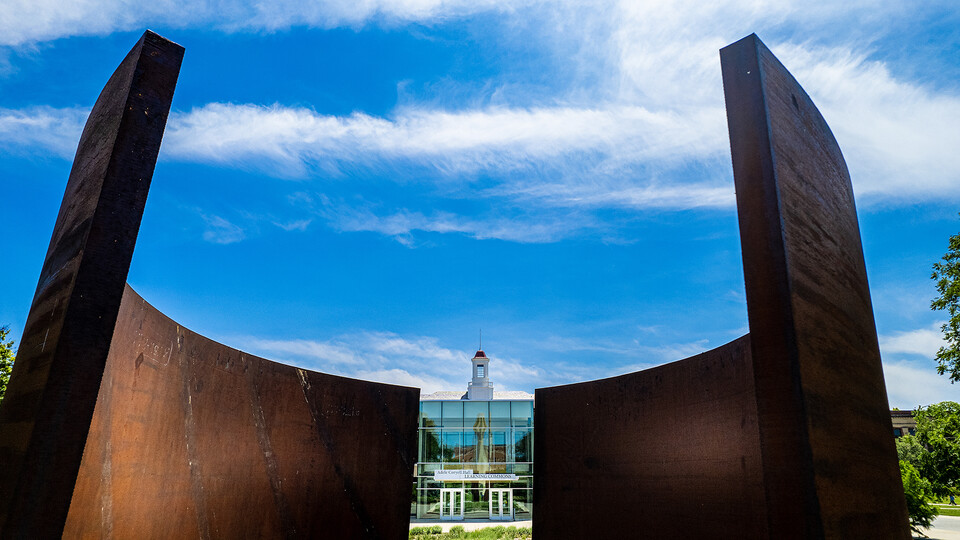
During a February expedition, Jay Storz, Willa Cather Professor of biological sciences at Nebraska, discovered that the yellow-rumped leaf-eared mouse — the world’s highest-dwelling mammal — lives at higher elevations than previously thought. Storz encountered the mouse atop the summit of a volcano on the Argentina-Chile border, at 22,110 feet, breaking the world record announced just last year. The discovery reframes a scientific quest to understand how these animals adapt to and survive in such a hostile environment, and the results could eventually have medical applications for people coping with low levels of oxygen due to disease, exertion or altitude sickness.
Stories on the research also appeared in National Geographic, Forbes, Popular Science, Telemundo and The Week.
• • •
Daizaburo Shizuka, biological sciences, has co-authored a new study explaining how the bright coloring of American coot chicks fits in with the reproductive strategy of their less colorful parents. Natural History Magazine published a March 1 article on the research.
• • •
New research from Eli Strauss and Daizaburo Shizuka, both biological sciences, suggests that failing to dominate lower-rated cubs in early tests of social rank can have serious consequences for "underperforming" hyenas. Phys.org ran a March 9 article on the research.
• • •
A paper on black homesteaders by the University of Nebraska’s Center for Great Plains Studies was cited in a March 1 Colorado Springs Gazette article on the black homesteading colony of Dearfield, Colorado. The authors wrote about a group that fled the South and aimed to settle in Craig, in northwest Colorado. The group ultimately failed, encountering similar problems as many others: a lack of financial support, local and political opposition and an inability to recruit enough families.
• • •
Chigozie Obioma, English, was featured in Fair Observer’s “The Interview” on March 5. He discussed his career, novels and the representation of colonialism in African literature.
Obioma was also a guest on the March 16 edition of ABC Radio’s “The Book Show.” He discussed how Nigerian culture influenced his second novel, “An Orchestra of Minorities.”
• • •
The university’s Center for Digital Research in the Humanities, led by Emily Rau, is an institutional collaborator in a new national effort to recover forgotten and little-known literature by women authors in digital environments. The center will design an online editorial environment for scholars to work on editing and publishing texts. WICZ published a March 10 story on the project. The story was picked up by the San Antonio Express-News and SF Gate.
• • •
A 2015 article co-authored by Daniel Brooks, adjunct research professor in the School of Biological Sciences, was cited in a March 12 Forbes story on how management of the current novel coronavirus pandemic might inform how future outbreaks caused by climate change are handled. Humans can expect more such illnesses to emerge as climate change shifts habitats and brings wildlife, crops, livestock and humans into contact with pathogens to which they are susceptible but to which they have never been exposed, the 2015 article said.
• • •
Geologist Matt Joeckel collaborated with Jesse Korus (Conservation and Survey Division) and Shane Tucker (University of Nebraska State Museum) to document and describe, via drone footage and computer modeling, the Haystack Mountain conglomerate in the Wildcat Ridge in Western Nebraska. Stories on the research appeared in the York News-Times and Environmental News Network.
• • •
A 2012 study co-authored by John Hibbing, political science, was cited in a March 16 Washington Monthly article on conservatives’ relaxed attitude about the COVID-19 pandemic and how that might change. The study found that when viewing a collage of photographs, conservatives’ eyes unconsciously lingered 15% longer on repellent images, such as car wrecks and excrement — suggesting that conservatives are more attuned than liberals to assessing potential threats.
• • •
Debra Hope, psychology, was interviewed for a March 17 Fast Company column on overcoming phone call anxiety. Hope recommended that the writer challenge “automatic thoughts,” perform a cost-benefit analysis and practice making a burst of short, low-stakes calls.
• • •
Kenneth Winkle, history, co-director of the research project Civil War Washington, was interviewed for a March 23 article in The Nation on the United States’ refusal to pay reparations to enslaved people or their ancestors. Winkle and colleagues have cataloged, digitized, transcribed and posted online nearly all of the petitions filed under the Compensated Emancipation Act of 1862, which compensated slave owners. Winkle said he believes there should be an effort to study reparations and determine some kind of corrective.
• • •
A recent study by Will Gearty, a postdoctoral researcher in biological sciences, suggests that ancient aquatic crocodiles got larger not because water released them from the constraints of land — as longstanding theories have proposed — but instead to insulate themselves against water's lower temperatures and its capacity to steal body heat. Phys.org ran a March 31 article on the research.


